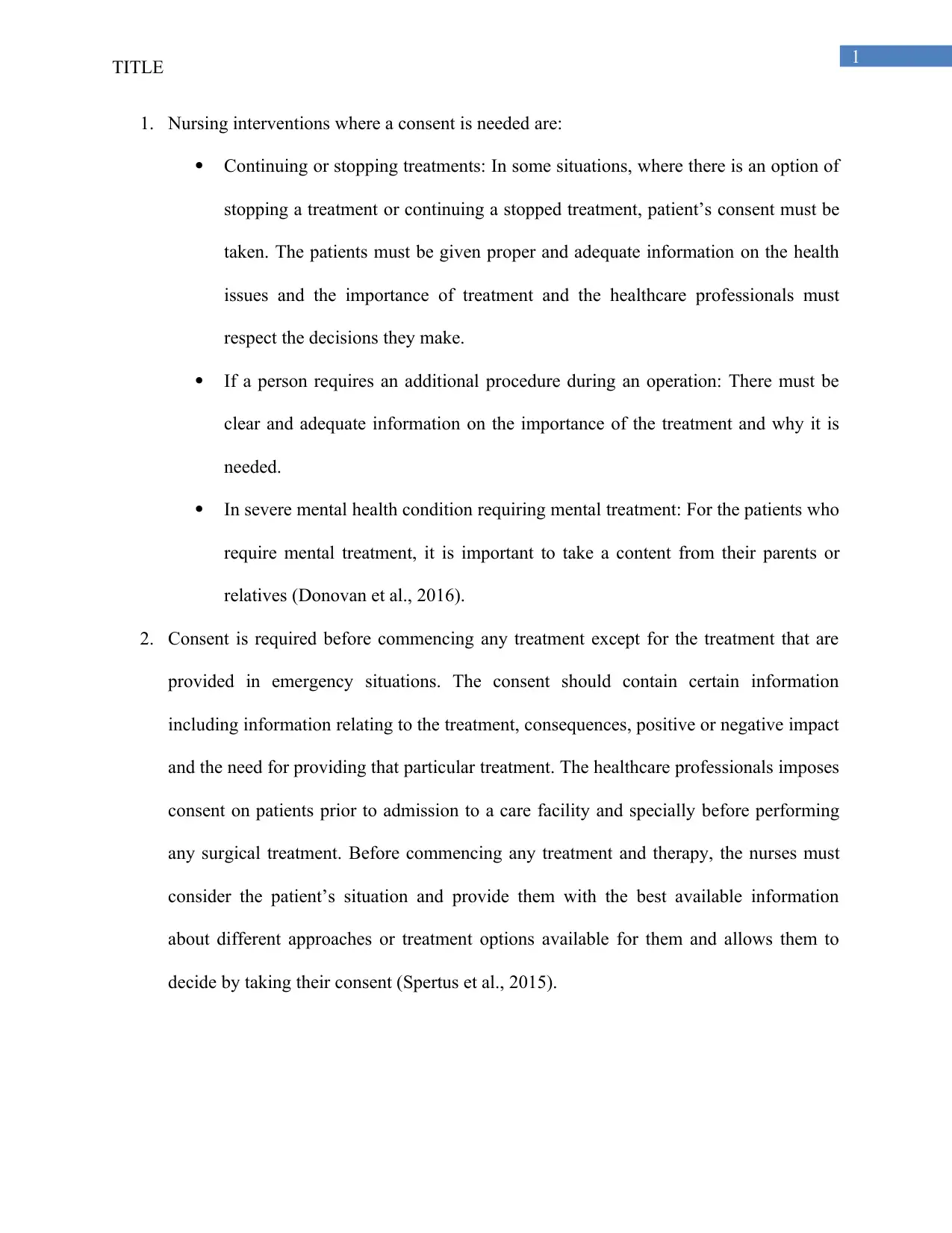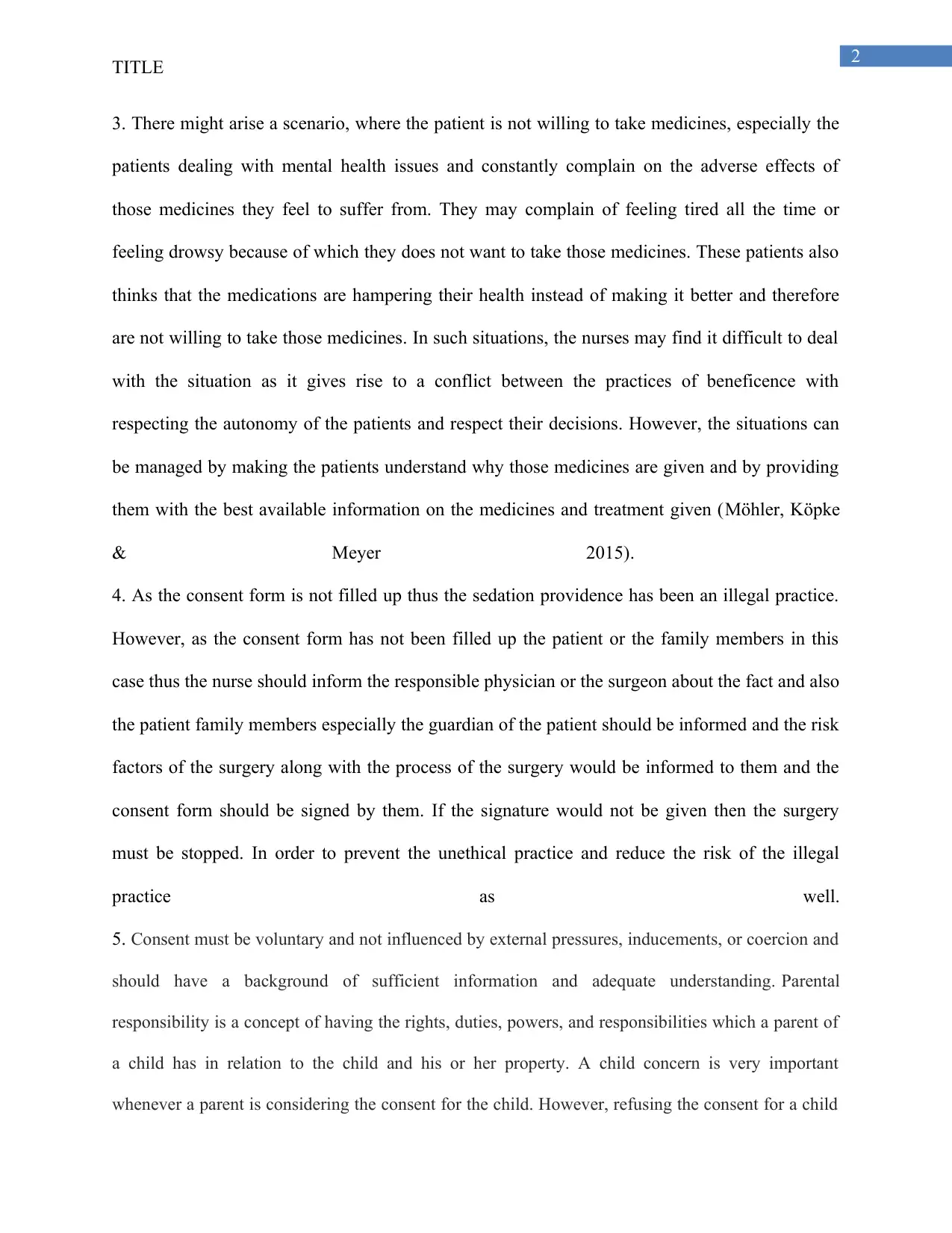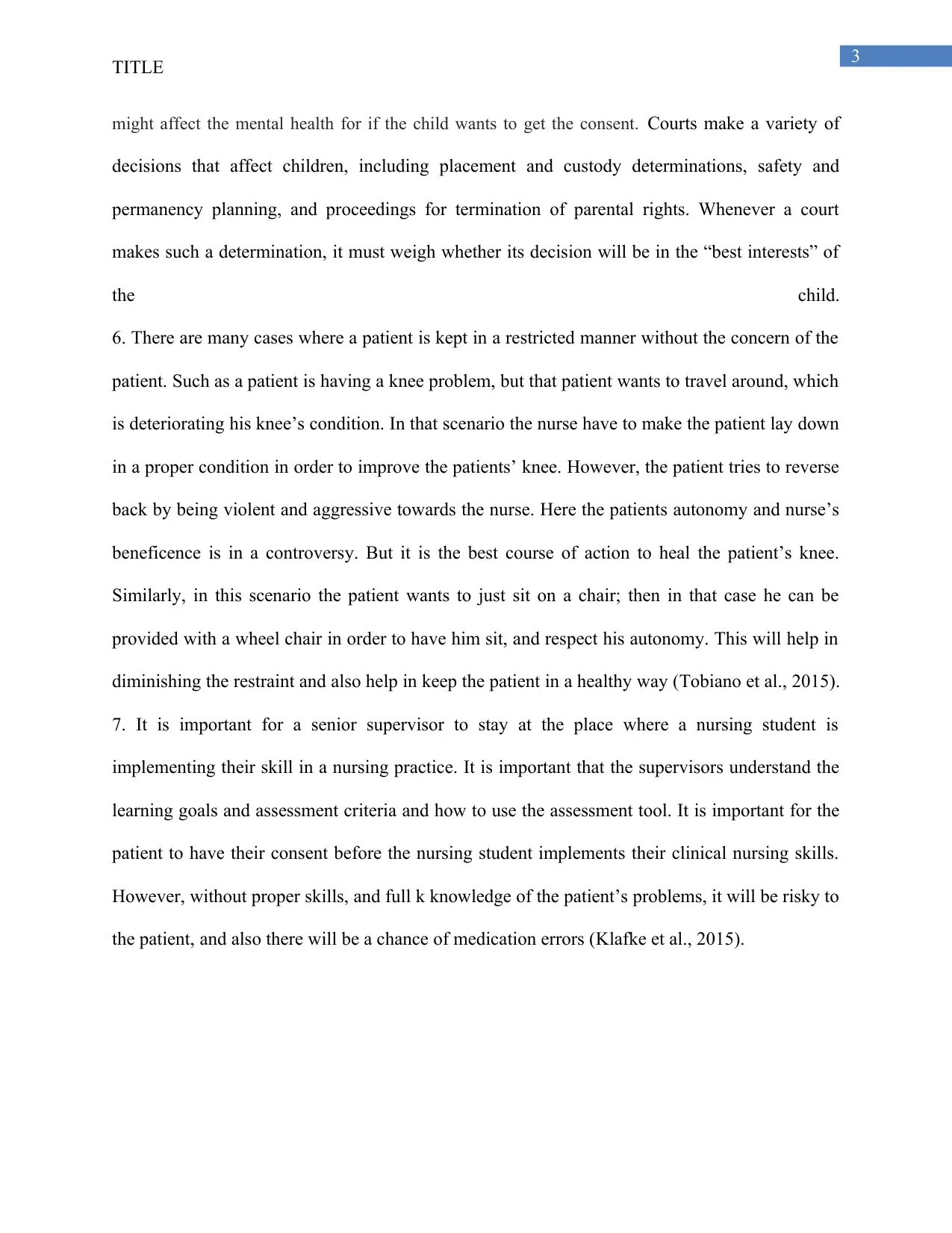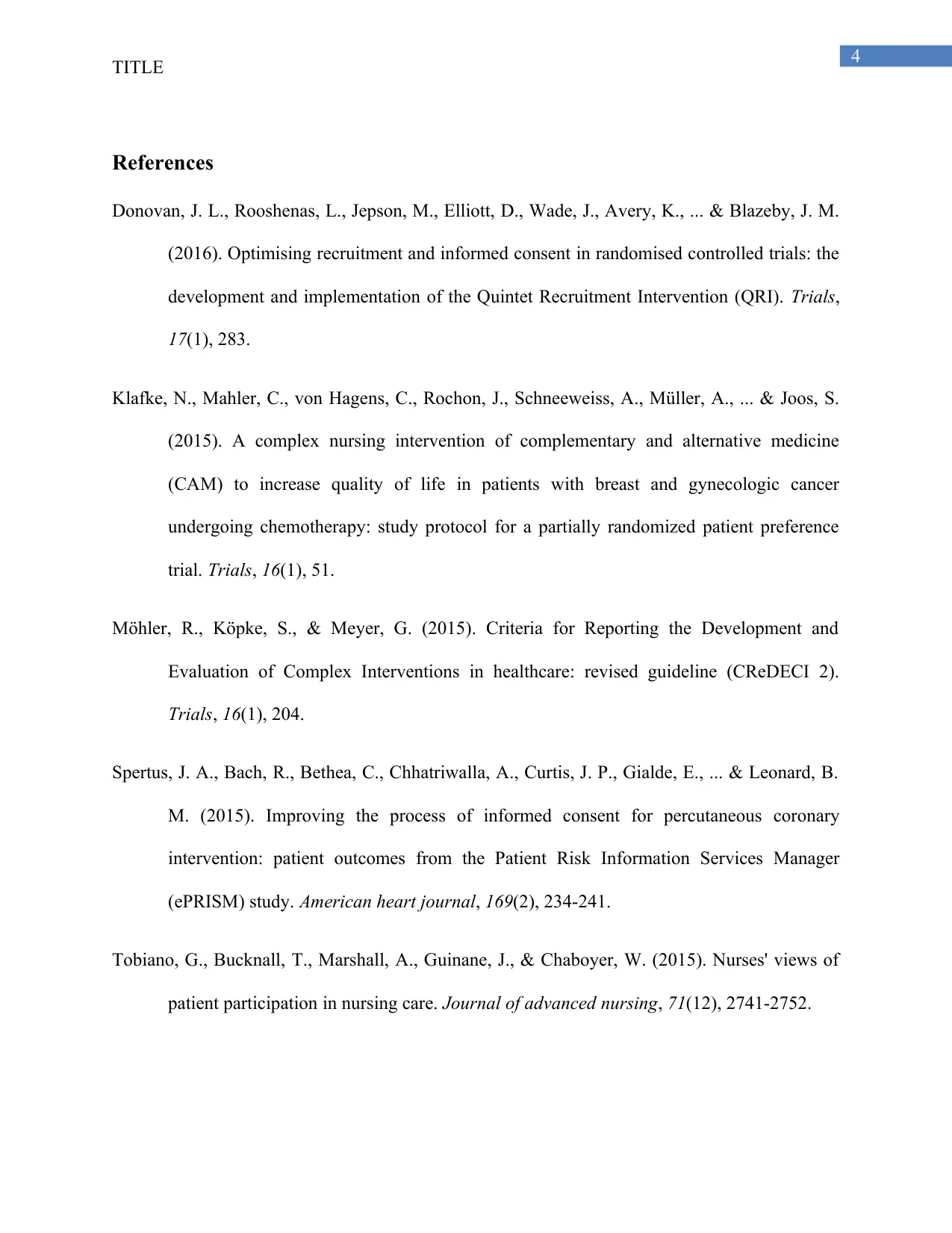Patient Consent and Nursing Interventions: Legal and Ethical Review
VerifiedAdded on 2022/10/04
|7
|1343
|23
Homework Assignment
AI Summary
This assignment delves into the critical role of patient consent in various nursing interventions, emphasizing ethical and legal considerations. It explores scenarios where consent is required, such as stopping or continuing treatments, additional procedures during operations, and mental health treatments. The paper discusses the importance of providing patients with adequate information to make informed decisions, addressing conflicts between beneficence and patient autonomy. It also highlights the consequences of not obtaining consent, particularly in situations like sedation, and the need to inform relevant parties and obtain proper signatures. Parental responsibility in consent for children is also examined. The assignment further explores situations where patient autonomy and beneficence may conflict, such as patient restrictions, and the importance of senior supervision during nursing student practices. The paper references several studies and guidelines to support its arguments.

Running head: TITLE
TITLE
Name of the student
Name of the university
Author’s name
TITLE
Name of the student
Name of the university
Author’s name
Paraphrase This Document
Need a fresh take? Get an instant paraphrase of this document with our AI Paraphraser

1
TITLE
1. Nursing interventions where a consent is needed are:
Continuing or stopping treatments: In some situations, where there is an option of
stopping a treatment or continuing a stopped treatment, patient’s consent must be
taken. The patients must be given proper and adequate information on the health
issues and the importance of treatment and the healthcare professionals must
respect the decisions they make.
If a person requires an additional procedure during an operation: There must be
clear and adequate information on the importance of the treatment and why it is
needed.
In severe mental health condition requiring mental treatment: For the patients who
require mental treatment, it is important to take a content from their parents or
relatives (Donovan et al., 2016).
2. Consent is required before commencing any treatment except for the treatment that are
provided in emergency situations. The consent should contain certain information
including information relating to the treatment, consequences, positive or negative impact
and the need for providing that particular treatment. The healthcare professionals imposes
consent on patients prior to admission to a care facility and specially before performing
any surgical treatment. Before commencing any treatment and therapy, the nurses must
consider the patient’s situation and provide them with the best available information
about different approaches or treatment options available for them and allows them to
decide by taking their consent (Spertus et al., 2015).
TITLE
1. Nursing interventions where a consent is needed are:
Continuing or stopping treatments: In some situations, where there is an option of
stopping a treatment or continuing a stopped treatment, patient’s consent must be
taken. The patients must be given proper and adequate information on the health
issues and the importance of treatment and the healthcare professionals must
respect the decisions they make.
If a person requires an additional procedure during an operation: There must be
clear and adequate information on the importance of the treatment and why it is
needed.
In severe mental health condition requiring mental treatment: For the patients who
require mental treatment, it is important to take a content from their parents or
relatives (Donovan et al., 2016).
2. Consent is required before commencing any treatment except for the treatment that are
provided in emergency situations. The consent should contain certain information
including information relating to the treatment, consequences, positive or negative impact
and the need for providing that particular treatment. The healthcare professionals imposes
consent on patients prior to admission to a care facility and specially before performing
any surgical treatment. Before commencing any treatment and therapy, the nurses must
consider the patient’s situation and provide them with the best available information
about different approaches or treatment options available for them and allows them to
decide by taking their consent (Spertus et al., 2015).

2
TITLE
3. There might arise a scenario, where the patient is not willing to take medicines, especially the
patients dealing with mental health issues and constantly complain on the adverse effects of
those medicines they feel to suffer from. They may complain of feeling tired all the time or
feeling drowsy because of which they does not want to take those medicines. These patients also
thinks that the medications are hampering their health instead of making it better and therefore
are not willing to take those medicines. In such situations, the nurses may find it difficult to deal
with the situation as it gives rise to a conflict between the practices of beneficence with
respecting the autonomy of the patients and respect their decisions. However, the situations can
be managed by making the patients understand why those medicines are given and by providing
them with the best available information on the medicines and treatment given (Möhler, Köpke
& Meyer 2015).
4. As the consent form is not filled up thus the sedation providence has been an illegal practice.
However, as the consent form has not been filled up the patient or the family members in this
case thus the nurse should inform the responsible physician or the surgeon about the fact and also
the patient family members especially the guardian of the patient should be informed and the risk
factors of the surgery along with the process of the surgery would be informed to them and the
consent form should be signed by them. If the signature would not be given then the surgery
must be stopped. In order to prevent the unethical practice and reduce the risk of the illegal
practice as well.
5. Consent must be voluntary and not influenced by external pressures, inducements, or coercion and
should have a background of sufficient information and adequate understanding. Parental
responsibility is a concept of having the rights, duties, powers, and responsibilities which a parent of
a child has in relation to the child and his or her property. A child concern is very important
whenever a parent is considering the consent for the child. However, refusing the consent for a child
TITLE
3. There might arise a scenario, where the patient is not willing to take medicines, especially the
patients dealing with mental health issues and constantly complain on the adverse effects of
those medicines they feel to suffer from. They may complain of feeling tired all the time or
feeling drowsy because of which they does not want to take those medicines. These patients also
thinks that the medications are hampering their health instead of making it better and therefore
are not willing to take those medicines. In such situations, the nurses may find it difficult to deal
with the situation as it gives rise to a conflict between the practices of beneficence with
respecting the autonomy of the patients and respect their decisions. However, the situations can
be managed by making the patients understand why those medicines are given and by providing
them with the best available information on the medicines and treatment given (Möhler, Köpke
& Meyer 2015).
4. As the consent form is not filled up thus the sedation providence has been an illegal practice.
However, as the consent form has not been filled up the patient or the family members in this
case thus the nurse should inform the responsible physician or the surgeon about the fact and also
the patient family members especially the guardian of the patient should be informed and the risk
factors of the surgery along with the process of the surgery would be informed to them and the
consent form should be signed by them. If the signature would not be given then the surgery
must be stopped. In order to prevent the unethical practice and reduce the risk of the illegal
practice as well.
5. Consent must be voluntary and not influenced by external pressures, inducements, or coercion and
should have a background of sufficient information and adequate understanding. Parental
responsibility is a concept of having the rights, duties, powers, and responsibilities which a parent of
a child has in relation to the child and his or her property. A child concern is very important
whenever a parent is considering the consent for the child. However, refusing the consent for a child
⊘ This is a preview!⊘
Do you want full access?
Subscribe today to unlock all pages.

Trusted by 1+ million students worldwide

3
TITLE
might affect the mental health for if the child wants to get the consent. Courts make a variety of
decisions that affect children, including placement and custody determinations, safety and
permanency planning, and proceedings for termination of parental rights. Whenever a court
makes such a determination, it must weigh whether its decision will be in the “best interests” of
the child.
6. There are many cases where a patient is kept in a restricted manner without the concern of the
patient. Such as a patient is having a knee problem, but that patient wants to travel around, which
is deteriorating his knee’s condition. In that scenario the nurse have to make the patient lay down
in a proper condition in order to improve the patients’ knee. However, the patient tries to reverse
back by being violent and aggressive towards the nurse. Here the patients autonomy and nurse’s
beneficence is in a controversy. But it is the best course of action to heal the patient’s knee.
Similarly, in this scenario the patient wants to just sit on a chair; then in that case he can be
provided with a wheel chair in order to have him sit, and respect his autonomy. This will help in
diminishing the restraint and also help in keep the patient in a healthy way (Tobiano et al., 2015).
7. It is important for a senior supervisor to stay at the place where a nursing student is
implementing their skill in a nursing practice. It is important that the supervisors understand the
learning goals and assessment criteria and how to use the assessment tool. It is important for the
patient to have their consent before the nursing student implements their clinical nursing skills.
However, without proper skills, and full k knowledge of the patient’s problems, it will be risky to
the patient, and also there will be a chance of medication errors (Klafke et al., 2015).
TITLE
might affect the mental health for if the child wants to get the consent. Courts make a variety of
decisions that affect children, including placement and custody determinations, safety and
permanency planning, and proceedings for termination of parental rights. Whenever a court
makes such a determination, it must weigh whether its decision will be in the “best interests” of
the child.
6. There are many cases where a patient is kept in a restricted manner without the concern of the
patient. Such as a patient is having a knee problem, but that patient wants to travel around, which
is deteriorating his knee’s condition. In that scenario the nurse have to make the patient lay down
in a proper condition in order to improve the patients’ knee. However, the patient tries to reverse
back by being violent and aggressive towards the nurse. Here the patients autonomy and nurse’s
beneficence is in a controversy. But it is the best course of action to heal the patient’s knee.
Similarly, in this scenario the patient wants to just sit on a chair; then in that case he can be
provided with a wheel chair in order to have him sit, and respect his autonomy. This will help in
diminishing the restraint and also help in keep the patient in a healthy way (Tobiano et al., 2015).
7. It is important for a senior supervisor to stay at the place where a nursing student is
implementing their skill in a nursing practice. It is important that the supervisors understand the
learning goals and assessment criteria and how to use the assessment tool. It is important for the
patient to have their consent before the nursing student implements their clinical nursing skills.
However, without proper skills, and full k knowledge of the patient’s problems, it will be risky to
the patient, and also there will be a chance of medication errors (Klafke et al., 2015).
Paraphrase This Document
Need a fresh take? Get an instant paraphrase of this document with our AI Paraphraser

4
TITLE
References
Donovan, J. L., Rooshenas, L., Jepson, M., Elliott, D., Wade, J., Avery, K., ... & Blazeby, J. M.
(2016). Optimising recruitment and informed consent in randomised controlled trials: the
development and implementation of the Quintet Recruitment Intervention (QRI). Trials,
17(1), 283.
Klafke, N., Mahler, C., von Hagens, C., Rochon, J., Schneeweiss, A., Müller, A., ... & Joos, S.
(2015). A complex nursing intervention of complementary and alternative medicine
(CAM) to increase quality of life in patients with breast and gynecologic cancer
undergoing chemotherapy: study protocol for a partially randomized patient preference
trial. Trials, 16(1), 51.
Möhler, R., Köpke, S., & Meyer, G. (2015). Criteria for Reporting the Development and
Evaluation of Complex Interventions in healthcare: revised guideline (CReDECI 2).
Trials, 16(1), 204.
Spertus, J. A., Bach, R., Bethea, C., Chhatriwalla, A., Curtis, J. P., Gialde, E., ... & Leonard, B.
M. (2015). Improving the process of informed consent for percutaneous coronary
intervention: patient outcomes from the Patient Risk Information Services Manager
(ePRISM) study. American heart journal, 169(2), 234-241.
Tobiano, G., Bucknall, T., Marshall, A., Guinane, J., & Chaboyer, W. (2015). Nurses' views of
patient participation in nursing care. Journal of advanced nursing, 71(12), 2741-2752.
TITLE
References
Donovan, J. L., Rooshenas, L., Jepson, M., Elliott, D., Wade, J., Avery, K., ... & Blazeby, J. M.
(2016). Optimising recruitment and informed consent in randomised controlled trials: the
development and implementation of the Quintet Recruitment Intervention (QRI). Trials,
17(1), 283.
Klafke, N., Mahler, C., von Hagens, C., Rochon, J., Schneeweiss, A., Müller, A., ... & Joos, S.
(2015). A complex nursing intervention of complementary and alternative medicine
(CAM) to increase quality of life in patients with breast and gynecologic cancer
undergoing chemotherapy: study protocol for a partially randomized patient preference
trial. Trials, 16(1), 51.
Möhler, R., Köpke, S., & Meyer, G. (2015). Criteria for Reporting the Development and
Evaluation of Complex Interventions in healthcare: revised guideline (CReDECI 2).
Trials, 16(1), 204.
Spertus, J. A., Bach, R., Bethea, C., Chhatriwalla, A., Curtis, J. P., Gialde, E., ... & Leonard, B.
M. (2015). Improving the process of informed consent for percutaneous coronary
intervention: patient outcomes from the Patient Risk Information Services Manager
(ePRISM) study. American heart journal, 169(2), 234-241.
Tobiano, G., Bucknall, T., Marshall, A., Guinane, J., & Chaboyer, W. (2015). Nurses' views of
patient participation in nursing care. Journal of advanced nursing, 71(12), 2741-2752.

5
TITLE
TITLE
⊘ This is a preview!⊘
Do you want full access?
Subscribe today to unlock all pages.

Trusted by 1+ million students worldwide

6
TITLE
TITLE
1 out of 7
Related Documents
Your All-in-One AI-Powered Toolkit for Academic Success.
+13062052269
info@desklib.com
Available 24*7 on WhatsApp / Email
![[object Object]](/_next/static/media/star-bottom.7253800d.svg)
Unlock your academic potential
Copyright © 2020–2026 A2Z Services. All Rights Reserved. Developed and managed by ZUCOL.





